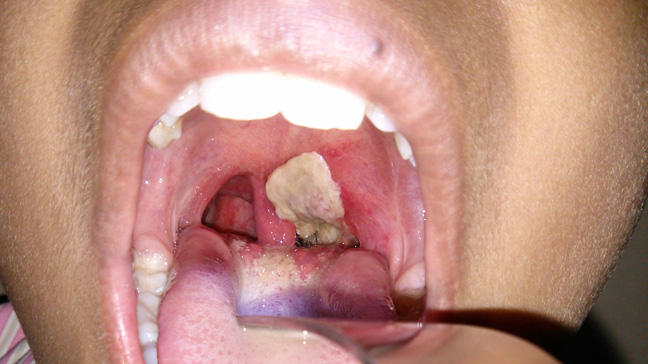Nigeria has been recording frequent outbreaks of diphtheria in the last one year. Medical experts and health institutions say everyone is at risk of the disease.
They say while vaccination is the major means of prevention, adopting measures to protect oneself and prevent spread to other people will help keep the disease at bay.
Diphtheria is a life-threatening infection caused by bacteria that is easily transmitted from person to person through coughing, sneezing and contact with open sore/blister/wound on the skin.
It is caused by a bacteria called Corynebacterium diphtheriae, which produces a toxin that cause severe damage to the respiratory system, heart, skin and other organs.
The Nigeria Centre for Disease Control and Prevention (NCDC) says the disease is spread through direct contact with infected persons, droplets from an infected person, coughing or sneezing, contact with contaminated clothing and objects.
The NCDC, in its latest situation report, said a total of 836 confirmed diphtheria cases, 2,455 suspected cases and 83 deaths have been recorded across eight states including the Federal Capital Territory (FCT) between May 2022 and June this year.
It said the confirmed cases were distributed across 33 local governments in eight states while the suspected cases were reported from 24 states.
The report said the majority (589 or 71.5%) of the confirmed cases occurred among children aged 2–14 years, and that only 181 (21.7%) out of 836 confirmed cases were fully vaccinated with a diphtheria toxin-containing vaccine.
Who is at risk of contracting Diphtheria?
The health promotion department of the Federal Ministry of Health said Everyone is at risk of getting infected with diphtheria, especially the following;
- Children under 5 years and adults above 60 years are more vulnerable.
- Children who have not completed 3 doses of Pentavalent vaccination
- People living in crowded areas
- People who practice poor personal hygiene
- People living in areas with poor environmental hygiene and sanitary condition
- People with weakened immune systems
- People that travel to infected areas
- People living in areas with poor access to health facility
- People caring or having close contact with someone infected with diphtheria
- Healthcare workers in endemic areas
Dr. Faisal Shuaib, the Executive Director of the National Primary Health Care Development Agency (NPHCDA), said symptoms of diphtheria depend on the body part that is affected.
He said, “Diphtheria can infect the respiratory tract and skin. People exposed to diphtheria usually start having symptoms in 2-5 days if they get sick.
“The bacteria most commonly infect the respiratory system. Common symptoms associated with respiratory symptoms include: weakness, sore throat, mild fever and swollen glands in the neck.
“The bacteria make a toxin that kills healthy tissues in the respiratory system. Within two to three days, the dead tissue forms a thick, gray coating that can build up in the throat or nose called “pseudomembrane.”
“It can cover tissues in the nose, tonsils, voice box, and throat, making it very hard to breathe and swallow.
“Respiratory diphtheria can lead to death. Even with treatment, about 1 in 10 patients with respiratory diphtheria die.
“Without treatment, up to half of patients can die from the disease. People with diphtheria are usually no longer able to infect others 48 hours after they begin taking antibiotics.
“If the toxin gets into the bloodstream, it can cause heart, nerve, and kidney damage. If a respiratory tract infection is suspected, the patient would have to be immediately treated with antibiotics.
“The bacteria can also infect the skin, causing open sores or ulcers. However, diphtheria skin infections rarely result in severe disease.”
How to prevent diphtheria
Dr. Shuaib said diphtheria is a vaccine-preventable disease, and that keeping up to date with recommended vaccines is the best protection against it.
He said the pentavalent vaccine prevents children against five childhood vaccine-preventable diseases.
“It is also recommended that close contacts (household members or people closely managing patients) of someone with diphtheria should receive antibiotics as prophylaxis to prevent them from getting sick,” he added.
Also to prevent the disease, the health promotion department of the Federal Ministry of Health, in a health advisory advised members of the public thus:
- Get Vaccinated: Diphtheria can be primarily prevented through vaccination. In Nigeria, 3 doses of Pentavalent vaccine are administered to children to prevent against 5 diseases namely Diphtheria, Tetanus, Pertussis (whooping cough), Hepatitis B and Hemophilus influenzae type B. The 3 doses are given as follows:
- 1st Dose at 6 weeks of age
- 2nd dose at 10 weeks of age
- 3rd dose at 14 weeks of age
However, Tetanus Diphtheria (Td) vaccine is also given to the following categories of persons:
- children 2-5years old during campaigns
- pregnant women during Anti Natal Care (ANC)
- health workers that are involved in handling diphtheria outbreak vaccination response.
Promote Herd Immunity; when a significant portion of the population is vaccinated, the spread of the disease is limited because those who may not be able to receive the vaccine due to medical reasons are protected.
Practice Good Personal hygiene as follows:
- Always wash hands with soap under clean running water
- Clean hands with alcohol-based hand sanitiser if there is no water
- Cover mouth and nose with tissue or bent elbow when coughing or sneezing. Throw used tissue into covered dustbin immediately
- Avoid close contact with sick persons
- Do not share personal items (clothes, cup, toothbrush) with another person
- Keep surroundings clean
- Avoid crowded places
- Go to the health facility if you have any of the symptoms of diphtheria.

 Join Daily Trust WhatsApp Community For Quick Access To News and Happenings Around You.
Join Daily Trust WhatsApp Community For Quick Access To News and Happenings Around You.


